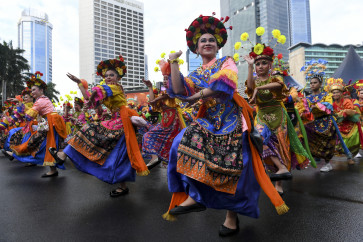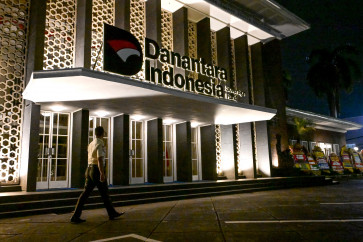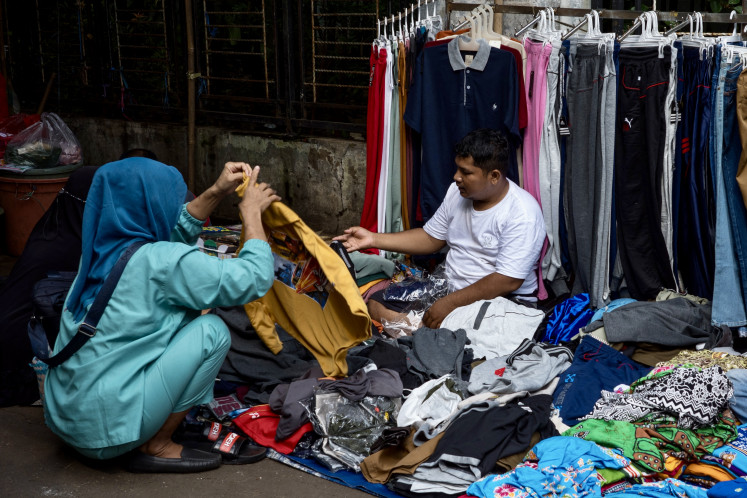Popular Reads
Top Results
Can't find what you're looking for?
View all search resultsPopular Reads
Top Results
Can't find what you're looking for?
View all search resultsAntonia Soriente: Indonesia’s Neapolitan Ambassador
(JP/Linawati Sidarto)Piazza San Domenico Maggiore is one of Naples’ most beautiful squares, flocked to by tourists who want to see its magnificent historical buildings
Change text size
Gift Premium Articles
to Anyone
(JP/Linawati Sidarto)Piazza San Domenico Maggiore is one of Naples’ most beautiful squares, flocked to by tourists who want to see its magnificent historical buildings. Very few people, however, know that one of those buildings is home to Italy’s sole center on Indonesia.
The gatekeeper of the University of Naples Orientale’s Indonesian department is Antonia Soriente, a native of the city who is also one of the world’s most prominent scholars on Indonesian linguistic anthropology.
“This is the only place in Italy that teaches Southeast Asian languages,” says Antonia, sipping an espresso at the Piazza before teaching her Indonesian class. “Until last year, Indonesian was the only SEA language taught here. Vietnamese was recently added.”
Antonia points out that unlike some European countries, like the Netherlands or the UK, Italy does not have any significant historical, cultural or economic ties with Indonesia. “Italians may have heard of Bali, but most would turn blank if asked about Indonesia.”
The arrival of Indonesian studies at the University of Naples, a bastion of oriental scholarship for the past three centuries, started more or less by accident as its Persian specialist Alessandro Bausami became interested in Malay culture. In 1964 he recruited Faizah Soenoto Rivai, a University of Indonesia graduate of Indonesian literature, to teach at his university’s department of Asian, African and Mediterranean Studies. When Rivai retired in 2009, Orientale beckoned its alumna Antonia, who had been living in Indonesia for the previous two decades, to return to her alma mater as a professor.
Antonia grew up in Nocera, a town just outside Naples, with her entrepreneur parents and four siblings. She had never heard of Indonesia until she entered Orientale as a linguistics student.
“I was planning to take a European language, but ended up taking the introduction class to Indonesian since that class was smaller than most other courses.”
Since then, Antonia and Indonesia have become inseparable. She went to live in Indonesia in 1991 to pursue her master’s degree at the University of Indonesia (UI). It was during that time that she became interested in the Dayak language and culture. While she called Jakarta home, she spent months at a time in remote areas in Eastern Kalimantan conducting her research. She is now one of the world’s most prominent scholars on Dayak linguistics.
Her expertise also goes beyond Dayak scholarship. She is a known personality in Jakarta’s arts and culture scene, and in addition to her extended publications on linguistics, she has translated literary works by authors like Ayu Utami.
While delighted to be back at her alma mater, Antonia knew that it would be hard work from day one. “I had spent the previous years as an independent scholar in Indonesia. At the university I have to put on many hats: develop the curriculum, teach classes, advise students, do administrative tasks, liaise with other institutions. I also have to continue publishing and presenting papers abroad.”
Meanwhile, on the receiving end, her students are rewarded with much more than just language courses. During her literature class, discussions range from Pramudya and his books to Indonesia’s latest gubernatorial elections process. “I try as much as possible to provide my students with an overview of current Indonesian life,” says Antonia, who is married to Faisol Reza, a former labor activist who is now an advisor at the Manpower and Transmigration Ministry.
Antonia makes full use of her rolodex. She has managed, despite her department’s limited budget, to invite numerous guest lecturers to Orientale, such as novelist Ayu Utami, journalist and writer Goenawan Mohamad and environmental activist Emmy Hafild. “I invite them to stay at my home to save on costs.”
Her students, like Alfonso Cesarano, are grateful. “We realize how lucky we are to have Ibu Antonia here. She is an integral part of Indonesian society, and we profit from that,” he explains in fluent Indonesian. Like his professor, Cesarano had heard little of Indonesia prior to entering Orientale.
Antonia strives to increase scholarly exchanges between her university and Indonesian institutions. Earlier this year, Cesarano spent three months in Jakarta, attending classes and gathering data for his thesis at UI. Two other Orientale students are now doing similar programs at UI.
Seven PhD candidates from Indonesian institutions such as UI, Gajah Mada University and the National Institute for the Sciences (LIPI) are currently at Orientale. They can attend classes and conduct research in their areas of specialty, which include anthropology, linguistics and oral traditions.
Her goal is to make these exchanges systematic instead of incidental. “We are about to sign a memorandum of understanding on this between my university and Indonesia’s education ministry.”
Despite all her efforts as a one-woman force, she realizes that students who want to get serious about being a scholar of Indonesia need to travel beyond Naples. “My goal is to get some students interested enough in studying Indonesia that they will continue to other universities with strong Indonesian departments in countries like the Netherlands, England or the US,” she says.
“I hope that there will be more Italian specialists on Indonesia in the future.”
Cesarano, who is a third year student, may follow that path. “The more I learn about Indonesia, the more I realize how little I still know. If I want to continue my studies on Indonesia, I know I will have to go abroad.”
For the time being, Antonia remains the only Italian expert on Indonesia. Her professional and personal live are rooted in both places: while spending most of the academic year in Naples, she is in Indonesia for at least three months. As soon as school ends for her and her two children, aged 10 and 12, she ships off to Indonesia. Husband Reza visits Naples whenever his work permits him to leave.
Her time in Jakarta is anything but idle as she continues her research on the Dayaks’ Penan and Kenyah dialects, taking her on long trips to East Kalimantan. “Sometimes, I take my family on my research trips.” She continues, laughing: “Sometimes my children are my research,” referring to her study on bilingualism in Italian-Indonesian children.










